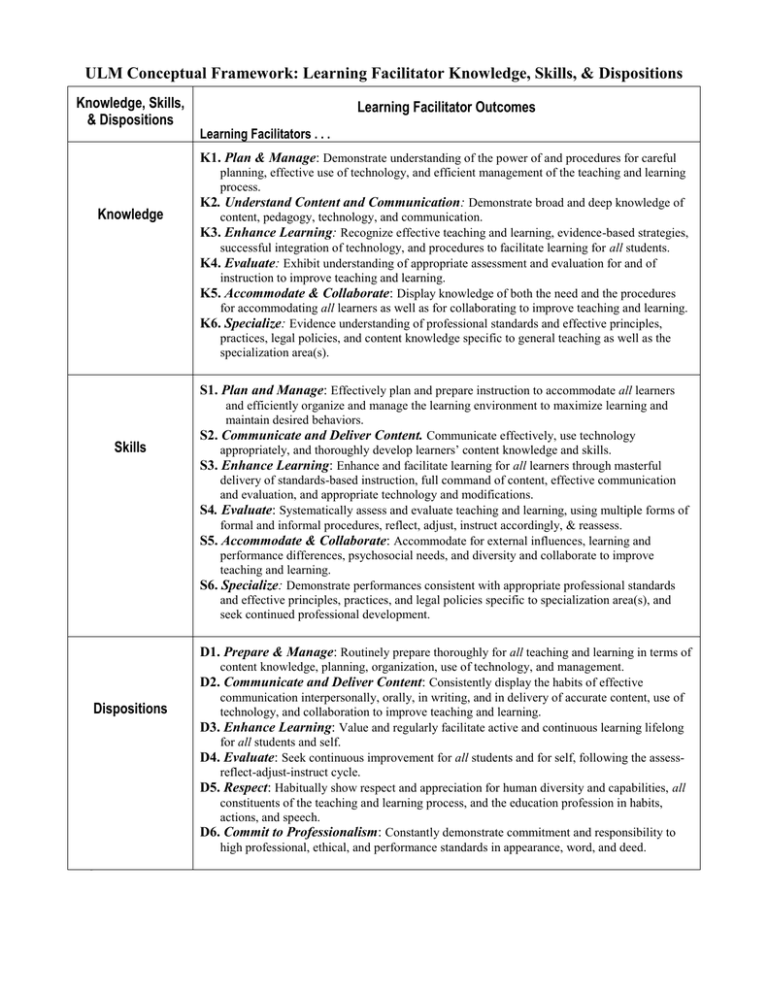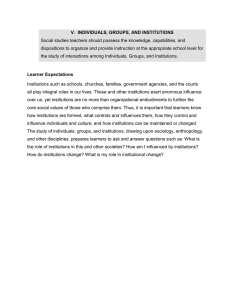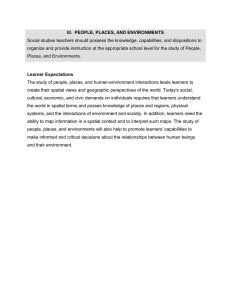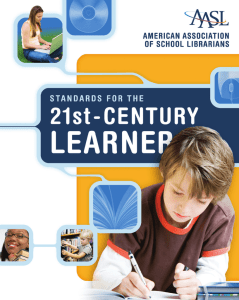ULM Conceptual Framework: Learning Facilitator Knowledge, Skills, & Dispositions Knowledge, Skills,
advertisement

ULM Conceptual Framework: Learning Facilitator Knowledge, Skills, & Dispositions Knowledge, Skills, & Dispositions Learning Facilitator Outcomes Learning Facilitators . . . K1. Plan & Manage: Demonstrate understanding of the power of and procedures for careful Knowledge planning, effective use of technology, and efficient management of the teaching and learning process. K2. Understand Content and Communication: Demonstrate broad and deep knowledge of content, pedagogy, technology, and communication. K3. Enhance Learning: Recognize effective teaching and learning, evidence-based strategies, successful integration of technology, and procedures to facilitate learning for all students. K4. Evaluate: Exhibit understanding of appropriate assessment and evaluation for and of instruction to improve teaching and learning. K5. Accommodate & Collaborate: Display knowledge of both the need and the procedures for accommodating all learners as well as for collaborating to improve teaching and learning. K6. Specialize: Evidence understanding of professional standards and effective principles, practices, legal policies, and content knowledge specific to general teaching as well as the specialization area(s). S1. Plan and Manage: Effectively plan and prepare instruction to accommodate all learners Skills and efficiently organize and manage the learning environment to maximize learning and maintain desired behaviors. S2. Communicate and Deliver Content. Communicate effectively, use technology appropriately, and thoroughly develop learners’ content knowledge and skills. S3. Enhance Learning: Enhance and facilitate learning for all learners through masterful delivery of standards-based instruction, full command of content, effective communication and evaluation, and appropriate technology and modifications. S4. Evaluate: Systematically assess and evaluate teaching and learning, using multiple forms of formal and informal procedures, reflect, adjust, instruct accordingly, & reassess. S5. Accommodate & Collaborate: Accommodate for external influences, learning and performance differences, psychosocial needs, and diversity and collaborate to improve teaching and learning. S6. Specialize: Demonstrate performances consistent with appropriate professional standards and effective principles, practices, and legal policies specific to specialization area(s), and seek continued professional development. D1. Prepare & Manage: Routinely prepare thoroughly for all teaching and learning in terms of content knowledge, planning, organization, use of technology, and management. D2. Communicate and Deliver Content: Consistently display the habits of effective Dispositions y les communication interpersonally, orally, in writing, and in delivery of accurate content, use of technology, and collaboration to improve teaching and learning. D3. Enhance Learning: Value and regularly facilitate active and continuous learning lifelong for all students and self. D4. Evaluate: Seek continuous improvement for all students and for self, following the assessreflect-adjust-instruct cycle. D5. Respect: Habitually show respect and appreciation for human diversity and capabilities, all constituents of the teaching and learning process, and the education profession in habits, actions, and speech. D6. Commit to Professionalism: Constantly demonstrate commitment and responsibility to high professional, ethical, and performance standards in appearance, word, and deed.






